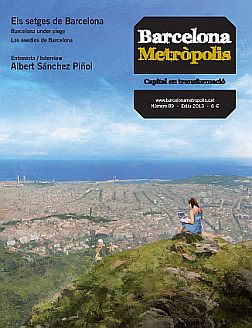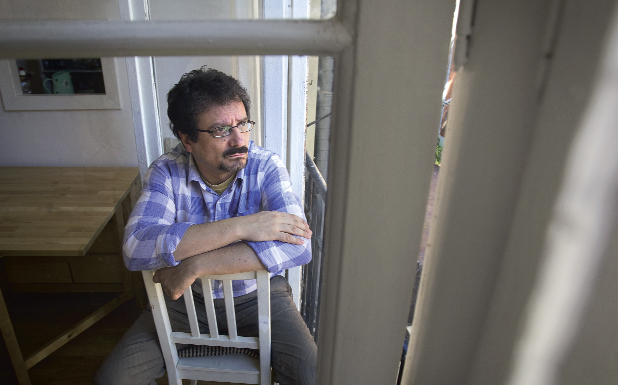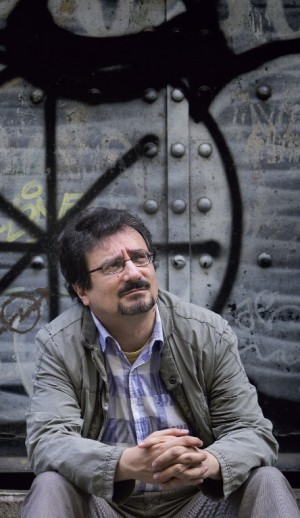I have an appointment with the writer Albert Sánchez Piñol; we have arranged to meet for coffee in the Canigó bar in Plaça de la Revolució. In all the years we have known each other, we have always shared a curiosity for our city, “a place where you never see it all”, as he says. Albert readily defines himself as a “Barcelonian to the bone”, although it was not until Victus that he wrote a story with Barcelona as its backdrop. I ask him why and he looks at me, half-smiling.
My books could have been written by a Bulgarian or a Turk; I never link the plot to a given landscape. For me, the actual story always matters much more than its setting.
Did it strike you as not being much of a literary city?
These kinds of definitions are stupid, an annoying cliché. Barring Tirana, every place in the world is literary.
So why have you taken so long to add Barcelona to your fiction?
It is very hard to know why writers talk about some things and not about others. Topics choose you, not the other way around. In fact, Victus had been in my head for some twenty years, but I found it more difficult to talk about my city than an island or a jungle, which are more metaphorical settings.
You often say that you are a Barcelonian through and through.
I was born here and have always lived here, so maybe that’s why I’m convinced that all us Barcelonians call ourselves Sánchez Piñol; we are the result of a fortunate mix. My fellow citizens remind me of the old baron of Maldà, always angry, criticising everything constantly. The local is obliged to be wary, and is therefore more forward-looking. People say we are cold and aloof, and perhaps there is some truth in that. For newcomers, it is very difficult to strike up social relationships, but if you manage to break the ice, friendships are usually for life. We have a reputation for being unfriendly, but I think we are a society where it is easy to take root.
What’s the reason behind this complicated personality?
I think the answer is probably to be found in our own history. This city has two lines of conflict, which become even more acute in a capital without a country. On the one hand there is a national conflict, that of a Catalonia that sometimes has to be unpleasant if it wants to survive. On the other hand there is a social or class conflict, the result of us being the only peninsular territory where there was an industrial revolution, and therefore a working-class mentality. The double dichotomy, between Catalan and Spanish and between proletarian and bourgeois, has shaped the way we relate to the world.
Nevertheless, you say that it is easy to take root here…
Yes, the city is a like big factory that produces Barcelona inhabitants. In Madrid they like to say that nobody is from Madrid, that they are all from somewhere else. In Barcelona, we say that everyone is from Barcelona if they want to be. Here we want to integrate even those who do not want to be integrated. Sometimes I think that many of the disagreements between the two cities are due precisely to this simple difference. Being from a hospitable place also means you have to manage diversity, and that is tiring; you have to make a huge and ongoing effort.
What are the usual channels for this integration process?
To begin with, you have to understand that Barcelona does not exist, and that in any event there are different Barcelonas. The Barcelona concept is very difficult to define; it is a city with many nuances, where the districts have played a fundamental role in creating an identity. Traditionally, immigrants were integrated through the language: anyone who spoke Catalan was Catalan. For a certain period the other route to integration was Barça, but the club has become too cosmopolitan. Anyone in the world can support Barça – from Bahrain to Tokyo, from Alaska to South Africa – which, when all is said and done, means nothing. For a long time I was a member of the Europa team, and there were no half measures there. Camp Nou is visited by Russians sporting Mexican sombreros as if they were going to a bullfight, who don’t even know what Catalonia is. At Europa’s ground, if there is a Pakistani it means he is integrated. Nobody can be integrated into universality; everyone is from somewhere, wherever that may be.
With a surname like Sánchez I assume that your parents also went through this process.
The first Sánchez in my family to settle in Barcelona came by sea, from Murcia. He was a cabin boy in a slave ship in the mid-nineteenth century, when slavery had already been outlawed. They were stopped by an English ship off the coast of Catalonia and he jumped overboard and swam to the neighbourhood of Barceloneta, where he decided to stay. On the other hand, the Piñols were Catalans from Matarraña, in Aragon, who came after the Spanish Civil War because the area was devastated. My paternal grandparents lived in Barceloneta, and the furthest they ever got was Wellington Street, where my father was born. My maternal grandparents set up in Guinardó, which was still a rural land peppered with orchards. My father lived by the sea, and my mother lived in the mountains. He worked in the iron and steel industry and she was a shop assistant at the El Águila department store in Plaça de la Universitat. It’s a strange world, because they met at the Gràcia street parties, at a dance in Plaça del Diamant, and I was born of that happy coincidence.
You are from Lower Guinardó. You are the only person I know who still talks about Lower Guinardó or Upper Guinardó. What do you remember about your neighbourhood?
Sociologically we were from Gràcia, but I studied at the Pare Claret religious school, and my schoolmates from Gràcia didn’t understand it that way. Lower Guinardó still had a small town-like structure; my friends were the children of my father’s friends, people who had known each other all their lives. It was a very wild, rough and difficult place, a border area between the city and the immigrant suburbs. I was always fighting with gangs of kids from Carmel, which was still a shanty town. Ours was the last generation where people spent more time in the street, and we bore the brunt of the conflict between city and children, between traffic and people. Definitive city development took longer to reach my neighbourhood than other areas. You could still play football on the street corners, despite accidents and knock-downs. Cars and children were fighting over space.
You are part of the 1960s baby boom.
Yes, we were the ones to suffer the Transition. There was an economic crisis like the present one, there was heavy unemployment and there was lot of everyday violence. It seems like it was a very civilised process, but that is not true. You spent more time in the street because the houses were uncomfortable – hot in summer and cold in winter. I lost half of my friends to drugs. Children now seem to be made of china; we were the last free generation. The problem with freedom is that it is dangerous; you can die.
It was a testosterone-heavy society.
There was political violence, then the violence that ruled the neighbourhoods – knife-toting juvenile louts. The small-time crooks came to our neighbourhood to steal from us; we were irreconcilable enemies. We later found out that the poor guys were even worse off than we were. It wasn’t an ethnic conflict, it wasn’t a language war, it wasn’t a problem of origins. We were facing off to be unique.
You were defending your territory.
We never left our block! It was a very property-related thing, a turf war with territorial pissing. Only occasionally did we organise forays beyond our borders. Outside the neighbourhood was all uncharted territory.
You spent a large part of your childhood in the street.
I learnt nothing at school. You spent time outside the house because it was uncomfortable at home; you got attacked on the streets and all just to get to a religious school! I learnt important things in the street, such as solidarity. My friends from then are still my friends now, regardless of class differences or personal development. On the other hand, I have no contact with any of my Pare Claret schoolmates.
How did you cut the umbilical cord?
The first time I ventured outside the neighbourhood was after my brother’s death. Until then I had worked at an insurance company and learned that no company can insure anything; life is not a guarantee. I quit and went on the dole. I went to live by myself in a flat in the street of Sant Jacint and ended up sharing a flat with the anthropologist Gustau Nerín. I was very happy there. My lack of pretensions gave me plenty of free time, and I took advantage of it by writing. At that time, the neighbourhood of Santa Caterina was highly populated. It exuded history; you could feel the weight of the centuries just walking along the pavement. Then came the trips to the Congo, and when I came back I took a large flat on Carrer Petritxol, in a much less popular neighbourhood.
Now it’s a tourist area.
It’s incredible how much it has changed in so few years. I wouldn’t go back there. Having said that, I think it’s very easy to criticise tourism. If we said the same things about immigrants that we say about tourists on a daily basis, we would all get sued. The problem is not tourism, but an industry which socialises damage, but not profits. The profits from tourism reach precious few people, but we all suffer the consequences. We have to learn to manage it in a different way. No city in the world would not want to be attractive to the rest of the world, but I think we have underused symbolic assets. The city is governed by a Catalan nationalist mayor but I don’t see “Welcome to Catalonia” posters on the walls. Why are we still selling Mexican sombreros and flamenco dancers? The tourism industry is not regulated. France is just next door and they don’t have the same problems as we do.
We don’t have the type of tourists we want?
And neither do we have the kind of tourist industry we want. At the tourist hot spots, prices rise and quality falls. We treat them terribly instead of looking after them, because after them come us. Barcelona cannot have the same city model as the one they allowed in Lloret de Mar.
Do you think Victus might attract tourists who come in search of the Barcelona of 1714?
I hope it does. Although they would quite possibly find it hard to see the people of that Barcelona in us. You have to remember that it was a very isocratic city, where rich and poor were mingled, lived wall to wall, and they realised more than we did that national rights and social rights are one and the same thing. Barcelona was basically a port, a very recreational port. The locals of the Baroque times were die-hard gamblers; even the clergy bet at ball courts and in the taverns, and then condemned gambling from the pulpit.
Did people gamble a lot?
There was a ball court on every corner where people gambled playing cards, dice, billiards and a primitive kind of tennis. That is something that has only changed in the last fifty or sixty years; before the Civil War many people gambled away their wages right after getting paid. They lived in a much poorer society than the present one, where personal solidarity networks brought security, not money. Life expectancy was very short, and generational changes were therefore very fast. At that time the future heritage was part of a person’s capital; it was normal for people to gamble it even when their parents were still alive. Nowadays people never die.
What do you think is the main difference from the city today?
People lived with the sea in mind and in sight. Barcelona was an Italian republic overlooking the Mediterranean. In fact, with the exception of Madrid, all the world’s capitals were ports. That explains why it was also very well connected with the outside world. Fashions in Paris reached us in a mere two weeks. It was a more dynamic society than ours today, in which the popular classes defended the institutions because the latter guaranteed their rights.
And then came the fall.
The bombings of the siege changed the appearance of the city and its inhabitants. In fact, we still suffer the consequences of that defeat. We are a people with many contradictions and doubts, the famous Catalan fatalism. We have not achieved a single military victory since James I of Aragon. Nevertheless, no one would have thought that we would manage to survive between two giants such as France and Spain, which have been anything but good neighbours. The Civil War hammered the last nails into the country’s coffin. No nation can endure so many losses and remain standing. In such a demographically weak country, the bloodshed of war has also been compounded by firing squad executions and exiles, in 1714 and in 1939. But when there is a period of peace, this feeling is revived, and always in the same direction. Therefore, we have to believe that democracy is Catalonia’s natural ally.
Could you recommend a good book for learning about Barcelona?
La ciutat del Born by Garcia Espuche. We really should be grateful to people like him. And then there is Narraciones históricas by Castellví, a book never released in Catalonia and published recently by a Carlist publisher in Madrid.
And a place to go for a stroll?
Carrer Verdi, because it is the heart of Gràcia, a neighbourhood I love. And then the area behind the Passeig del Born.
Do you like the tribute being carried out?
There is a lot of hypocrisy in the criticism. Nobody cared about the library or the market until the archaeological remains were found. The problem is that the ruins are, in themselves, rather unspectacular. They do not contribute much. More than a tribute, what we need to do is avoid revisionism. Make it clear that those people defended constitutions and liberties they already had and did not want to lose.
Do you realise that you have become an ambassador for Barcelona?
Cities are a brand that helps writers, but writers consolidate the brand. It is fiction that creates imagery, and not vice-versa. Victus is a universal story, the story of someone defending his home against tyranny. What we have to sell to the rest of the world is our point of view and our creativity.






Pingback: Albert Sánchez Piñol: “Barcelona és una gran fàbrica de fer barcelonins” | VICTUS Barcelona 1714
Me parece que no me he perdido nada no leyendo Invictus.
El senyor Sanchez Piñol, antropòleg, diu, és un patriota. Hauria de coneixer la frase de Samuel Johnson: “El pa-triotisme és la darrera trinxera dels canalles”, reproduida al film “Senderos de gloria”, de Stanley Kubrick. No sé si sap
qui era Proudhon, qui deia que “porto la patria a la sola de la sabata i les banderes les tinc al water de casa”. El clan pujolisme i els seus adláteres i capos actuals són un exemple perfecta de la canalla patriótica.